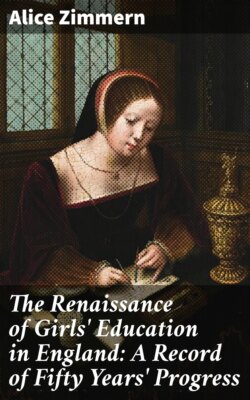The Renaissance of Girls' Education in England: A Record of Fifty Years' Progress

Реклама. ООО «ЛитРес», ИНН: 7719571260.
Оглавление
Alice Zimmern. The Renaissance of Girls' Education in England: A Record of Fifty Years' Progress
The Renaissance of Girls' Education in England: A Record of Fifty Years' Progress
Table of Contents
PREFACE
CHAPTER I. BEFORE 1848
CHAPTER II. THE FIRST COLLEGES
CHAPTER III. LIGHT IN DARK PLACES
CHAPTER IV. THE HIGH SCHOOLS
CHAPTER V. ENDOWMENTS FOR GIRLS
CHAPTER VI. THE WOMEN’S COLLEGES
CHAPTER VII. ADMISSION TO UNIVERSITIES
CHAPTER VIII. BOARDING AND PRIVATE SCHOOLS
CHAPTER IX. THE TECHNICAL INSTRUCTION ACTS
CHAPTER X. STATE AID FOR GIRLS
CHAPTER XI. THE INTERMEDIATE SCHOOLS OF WALES
CHAPTER XII. 1898
INDEX
Отрывок из книги
Alice Zimmern
Published by Good Press, 2021
.....
These two earliest colleges may be regarded as not only pioneers but also parent institutions. They drew within the sphere of their influence many of those women who were to train up the next generation. Among the earliest pupils of the Queen’s College evening classes was Miss Buss, who was already teaching in her mother’s private school, and was destined to found the first public school for girls. She was one of the first to win the governess diploma. Another was Miss Dorothea Beale, so well known for her work at Cheltenham. She remained at Queen’s from 1849 to 1856, first teaching Mathematics, then Latin, and afterwards in charge of the school. In 1858 she became Principal of the Cheltenham Ladies’ College, which had already been at work for five years.
The Cheltenham College differed in its original idea from Queen’s and Bedford. Both these had been founded with the purpose of giving women such advanced education as they were at that time capable of receiving, and had gradually been compelled by the exigencies of the case to provide for girls as well. Cheltenham, though called a college in imitation of the boys’ college in that town and some other public schools, really aimed in the first instance at providing for girls similar educational advantages to those which their brothers enjoyed in the same town. As King’s College had suggested Queen’s, the boys’ college at Cheltenham suggested the girls’. Twelve years elapsed between the foundation of the two; and Queen’s and Bedford were already pointing the way when a small committee of enthusiasts met at the house of Mr. Bellairs, one of H.M. Inspectors, and drew up a prospectus, inviting the public to take shares in the new undertaking. A day-school was all that was at first contemplated, and the subjects to be taught there were described as Holy Scripture and the Liturgy, history, geography, grammar, arithmetic, French, music, drawing, needlework. German, Italian, and dancing to be extras. The proposal found favour. Shares to the amount of about £2000 were taken up, a house hired, and the new venture started with good auspices, 88 pupils entering the first term, and the numbers soon going up to 120. It is not quite easy to understand why this prosperous beginning was not followed up. After a while the numbers went down, and the college seemed to be losing favour. Probably it was ahead of local public opinion, not yet abreast of North London, where Miss Buss was already successfully at work. The first years were times of struggle, and even the appointment of Miss Beale in 1858 did not at once turn the scale. After forty years of successful work in the college, Miss Beale can enjoy the pleasure of contrasting then and now. Some of her reminiscences throw a curious light on public opinion in the early fifties. The curriculum, unpretentious as it seems, proved too advanced. Parents objected to the thoroughness of the teaching, and the time given to arithmetic and similar subjects. Some disliked the annual examination, which was held to be unfeminine, and the difficulty of obtaining good teachers was almost insuperable. In regard to these Miss Beale suffered through being ahead of her times. She desired especially two things: that the teachers should be women, for, to quote her own words, ‘we think it essential to the right moral training of girls that the whole internal discipline and much of the moral training should be in the hands of ladies’; and that they should be to some extent specialists, the only way to abolish the textbook cram and unintelligent memory work then in vogue in girls’ schools. How she set out again and again to seek for teachers, and how many a time she was disappointed, she has herself recorded in her history of the college. Her efforts show how hard it was to found a school before the reformation of the higher education had given the necessary impetus from above. It was a case of making bricks without straw.
.....